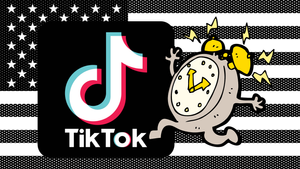When the US TikTok ban went into effect last month the app was up and running again less than a day after it went offline, thanks to the intervention of President Donald Trump via one of the flurry of executive orders he issued on assuming the presidency. However the app’s future in the US market still remains uncertain.
Trump’s executive order put the TikTok ban on hold for just 75 days, making 5 Apr the next deadline to find a solution that addresses the data security concerns that prompted Congress to instigate the ban in the first place.
Right now it’s still not clear what that solution may be, though Trump’s Vice President JD Vance is apparently working on a solution, so what could possibly go wrong? Nevertheless, for American creators and musicians using TikTok, it’s far from assured that the platform will still be available in the US by Easter.
Meanwhile in the UK, the government has said that the fact it’s launched an official TikTok account doesn’t mean the ban on using the app on government devices, because of the same data security concerns, has been lifted.
Although, presumably, despite that ban, the government has installed the app on at least one official device, unless ministers are outsourcing the posting of content to the government’s TikTok account to an external agency. Though how exactly ministers will monitor that content is another question. Quite how many government ministers have burner phones for their secret TikTok accounts is probably a question best not examined too closely.
All those security concerns, of course, relate to TikTok’s ownership by China-based ByteDance, and fears that the Chinese government has access to user-data - though that is something TikTok has repeatedly denied. US Congress last year ordered ByteDance to sell TikTok or be banned in the US on 19 Jan. ByteDance insisted it wouldn’t sell and instead unsuccessfully tried to get the ban overturned on constitutional grounds in the American courts.
Since Trump paused the ban, there has been lots of talk about the different American companies and billionaires that may or may not be interested in buying TikTok.
At one point it was rumoured that Chair of the Trump Suck Up Club, and puppet master in chief, Elon Musk was interested. ByteDance subsequently denied he’d made any approaches and last week it turned out Musk himself had confirmed that fact at a conference in late January. “I’m not chomping at the bit to acquire TikTok”, he said during an interview at the event.
Even with Musk sitting it out, there’s definitely plenty of interest in the US in buying some or all of TikTok. And when Trump recently signed yet another executive order instructing the US treasury and commerce departments to create a sovereign wealth fund, he said that fund might be used to purchase TikTok.
However, it’s still not clear what kind of deal, if any, would be accepted by ByteDance and the Chinese government, which would have to approve the transaction. Trump has talked about 50/50 ownership between US and Chinese companies, though TikTok’s critics in Congress would have to be assured that that kind of deal still addressed the data security concerns.
That said, there is some optimism in Congress that ByteDance will now agree to a deal, despite insisting in the past that it would rather shut down in the US than sell the app. That’s less to do with Trump now calling the shots in the White House and more because ByteDance has run out of options to block the sell-or-be-banned law through the courts.
Raja Krishnamoorthi, ranking member of the snappily named Select Committee On Strategic Competition Between The US And The Chinese Communist Party in the House of Representatives, said as much in an interview with NBC News. “There’s only so much they can try to do to change the law - and it all failed”, he told the broadcaster. Now they need to work “with the law”, and that might mean being more amenable to some kind of deal to sell some or all of the app. We shall see.
Meanwhile, while TikTok continues to operate happily in the US - and Trump has assured everyone that his government will not enforce the sell-or-be-banned law against either TikTok or any company involved in supporting or distributing it - neither Apple nor Google have returned the app to their respective app stores. It’s almost as if some people think Trump is someone subject to changing his mind about things on a whim.
With Apple and Google still seemingly nervous about distributing TikTok within the US, TikTok itself announced on Friday that Android users can now download the app directly from its website. Unlike with iOS, Android users can download apps from outside Google’s own App Store.
Which means American Android users who’ve never installed TikTok before can still do so. Maybe they’re excited about the new UK government TikTok account that was launched last week, and that’s what finally persuaded them to get the app installed - to hell with the data security issues.
Though, as noted, people using UK government issued phones can’t take such a slack approach to data security. When asked if the launch of a government TikTok account meant a previous ban on using TikTok on British government devices had been lifted, a spokesperson for Prime Minister Keir Starmer insisted that wasn’t the case.
“Restrictions on the use of the app on most government devices remain in place”, he told reporters, before adding, “In line with security advice, we’ve been permitted the use of a UK government TikTok account... under specific circumstances”.
“It was always the case that there were specific exemptions for the use of TikTok on government devices where required for work purposes”, he then explained, adding, “those exemptions are only granted by security teams on a case-by-case basis and with security mitigations put in place”.

